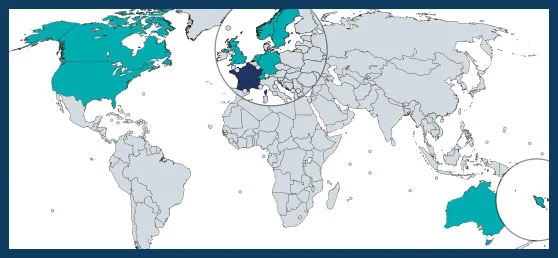12-2018 to 04-2022
€ 1,856,569
David Mouillot
david.mouillot@umontpellier.fr
University of Montpellier, FRANCE
Ecole Pratique des Hautes Études, Perpignan, FRANCE
James Cook University, Townsville, AUSTRALIA
Dalhousie University, Halifax, CANADA
Institut de Recherche pour le Développement, Noumea, Nouvelle- Calédonie, FRANCE
Leibniz Centre for Tropical Marine Research, Bremen, GERMANY
Uni Research, Bjerkenes Centre for Climate Research, Bergen, NORWAY
Stockholm University, SWEDEN ETH Zurich, SWITZERLAND
Vrije Universiteit Amsterdam, THE NETHERLANDS
Lancaster University, UNITED KINGDOM
Julie Ann Wrigley Global Institute of Sustainability, Honolulu, USA
University of Hawai, Honolulu, USA
University of California, Santa Barbara, USA
University of Tasmania, Hobart, AUSTRALIA
Wildlife Conservation Society, Bronx, USA
UN Environment World Conservation Monitoring Centre, Cambridge, UNITED KINGDOM

On tropical and temperate shallow reefs (< 50 m deep), perhaps more than anywhere in the world, natural and human systems share a history of strong interconnection that must be considered in any attempt to secure, on one side, the long-term human development and well-being, and, on the other side, marine biodiversity. Surprisingly, we still lack integrated scenarios for simulating the dynamics of shallow reefs social-ecological systems on a long-term basis to better anticipate their futures within a context of global changes (climate and human demography).
The project will to follow a data-to-model-to-decision-making process and will meet two main objectives:
• Based on a global database of fish surveys over more than 5,000 reefs, determine the conditions (governance, social, economic, and environmental) under which five key ecosystem services provided by reef fishes are currently maintained or threatened: (i) biomass production providing livelihoods, (ii) nutrient cycling that affects productivity, (iii) regulation of the carbon cycle that affects atmospheric CO2 concentration, (iv) cultural value that sustains tourism activities, and (v) nutritional value insuring food security. the project will estimate, through multivariate and non-linear models, the boundaries or thresholds beyond which these ecosystem services may collapse.
• Predict the potential futures of these services and more generally of the social-ecological systems under various global change scenarios. Using multiple integrated scenarios (human demography, economic development and climate change) and predictive models, the project will simulate the dynamics of shallow reef ecosystems and their ability to deliver these services during the next century.
The kick-off meeting will be organised in Montpellier the 17th-21st of June 2019. The first task is to determine the value of five services on 5,000 reefs around the world. In parallel the project will collect the environmental (e.g. temperature), habitat (e.g. coral cover), socioeconomic (e.g. human density) and institutional (e.g. management) conditions on the same reefs to build various predictive models (Bayesian, Structural Equations) for the 5 services. The various futures of reef services will be then projected according to many scenarios to provide a range of potential trajectories and appropriate management options able to modify these trajectories.
The dissemination strategy will use 5 main channels:
• Make end-users accessing the results in an interactive and intuitive way using web-based tools;
• Inform, but also consult, a broader audience of stakeholders through meetings;
• Write biannual e-newsletters to disseminate our progresses and results;
• Produce a film on reef services;
• Organise a final conference and summer schools to share our findings and our tools.